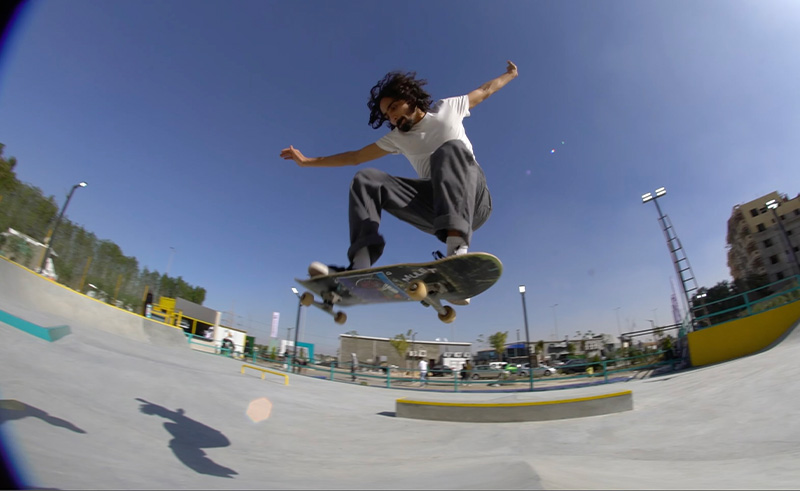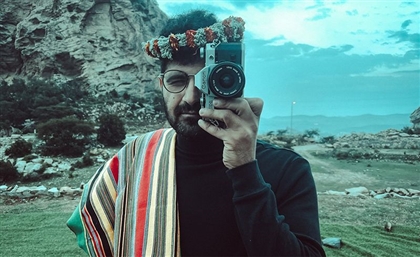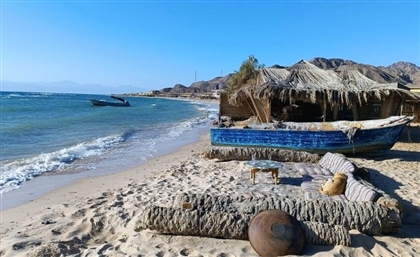The Skaters Chronicling the History of Skateboarding in Egypt
Hani Talat and Yehia O are keeping the sport’s heritage alive, giving new skaters a feeling of belonging.

Plastic skateboard wheels rumble along the tired tarmac of Zamalek’s Ibn Zinky Street, cruising over the speed bump outside the window of what was my childhood bedroom nearly 15 years ago. Damn I’m getting old. And whilst my memories of those years may not be the clearest, I have no recollection of skaters in the streets of Zamalek during my childhood. I probably thought that skating hadn’t yet made it to Egypt at all. I thought wrong.
 Though Zamalek may not have been the skateboarding haven that it has now become since 2010, this does not speak to the absence of skating in Egypt full stop, where a local scene has been developing since the late 70s. However, one can forgive my childhood self for his assumption, for skating and its proponents have had anything but an easy time establishing themselves in the country. All the more reason to tell the much-maligned history of skateboarding in Egypt.
Though Zamalek may not have been the skateboarding haven that it has now become since 2010, this does not speak to the absence of skating in Egypt full stop, where a local scene has been developing since the late 70s. However, one can forgive my childhood self for his assumption, for skating and its proponents have had anything but an easy time establishing themselves in the country. All the more reason to tell the much-maligned history of skateboarding in Egypt.
“Back in 2008, we didn’t have many skaters, and a lot of people stopped skating because there wasn’t enough support. No skate parks, no nothing,” explains Hani Talat, cinematographer, skater, and founder of Amulet Skateshop and Rad Collectives, a relaunched audiovisual platform dedicated to archiving skateboarding history in Egypt.
 Since he started skating in the mid-2000s, Talat has been engaged in documenting fellow skaters in the local scene, creating videos similar to the ones that inspired him to start skating in the first place. “I started skating after playing ‘Tony Hawk’s American Wasteland’, a video game that played real videos of real skaters doing real tricks on its loading screen,” he says. “I thought ‘wow, people can actually do these tricks in real life?’”
Since he started skating in the mid-2000s, Talat has been engaged in documenting fellow skaters in the local scene, creating videos similar to the ones that inspired him to start skating in the first place. “I started skating after playing ‘Tony Hawk’s American Wasteland’, a video game that played real videos of real skaters doing real tricks on its loading screen,” he says. “I thought ‘wow, people can actually do these tricks in real life?’”
Inspired by clips he’d seen in the video game, Talat began making skate films. “I used to use my mum’s film cameras back in the day,” he recalls. “And I had this massive VHS camera that I filmed on too.”
 Only a month before the January 25 Revolution, Talat released ‘Cairo’s Comeback’, the first fully-fledged skate film to come out of Egypt. It featured clips of the capital’s best skaters - not to be conflated with the country as a whole, for fear of aggravating the Cairo-Alexandria skate rivalry. Amongst those skaters was Yehia O, now Talat’s partner at Amulet Skateshop, who had been skating in Egypt since the late 90s.
Only a month before the January 25 Revolution, Talat released ‘Cairo’s Comeback’, the first fully-fledged skate film to come out of Egypt. It featured clips of the capital’s best skaters - not to be conflated with the country as a whole, for fear of aggravating the Cairo-Alexandria skate rivalry. Amongst those skaters was Yehia O, now Talat’s partner at Amulet Skateshop, who had been skating in Egypt since the late 90s.
“I started skating in a smooth passageway at Madina Riyadiya in Heliopolis, and soon enough younger kids would come up to me and ask if I could teach them,” Yehia reminisces. “Fast forward three years later, and there were about 50 kids gathering every Thursday night to skate on that one area of smooth surface.” Immediately after the revolution, people looked back at the early to mid-2000s as the heyday of skating in Egypt.
 Had the timing of the film’s release been different, it could well have been the impetus needed to push the local skateboarding scene to the next level, showing the next generation of skaters the potential in the sport. It wasn’t to be. The revolution and the immediate years that followed made skating in Egypt even harder, inviting intolerance and suspicion at every corner.
Had the timing of the film’s release been different, it could well have been the impetus needed to push the local skateboarding scene to the next level, showing the next generation of skaters the potential in the sport. It wasn’t to be. The revolution and the immediate years that followed made skating in Egypt even harder, inviting intolerance and suspicion at every corner.
However, skating and its resilient subculture persisted, and were still going strong in the late 2010s when Talat returned to Egypt, having moved to Dubai and worked in procurement for a Emirati skate shop in the city. With his experience and newfound vigour for bringing the best out of Egypt’s scene, he teamed up with Yehia to found Amulet Skateshop in 2022, bringing the best of international skate brands to the country. No longer did skaters have to go to great lengths to import genuine boards, or make do with knock-off equipment.
“We don’t make a profit out of skateboarding. That’s not the goal,” Talat says. “We take the money we make, and we invest it into the business, into the community.” The sincerity behind his words is tangible; with all of his action, he means to contribute to the legacy of skateboarding in Egypt, whilst also ensuring that the sport’s future is one of promise and growth rather than decline and decay.
 It is the interplay between chronicling Egypt’s skateboarding legacy and ensuring its growth where Talat’s focus now lies. This much was clear at the History of Skateboarding in Egypt Exhibition at Downtown’s The Factory, the first of its kind to take place in the country. Centred around a bespoke set of ramps and rails designed for the event, the walls of the space were adorned with archival photos telling the story of Egypt’s skateboarding history, alongside dynamic footage and heartfelt descriptions of its growth over the years.
It is the interplay between chronicling Egypt’s skateboarding legacy and ensuring its growth where Talat’s focus now lies. This much was clear at the History of Skateboarding in Egypt Exhibition at Downtown’s The Factory, the first of its kind to take place in the country. Centred around a bespoke set of ramps and rails designed for the event, the walls of the space were adorned with archival photos telling the story of Egypt’s skateboarding history, alongside dynamic footage and heartfelt descriptions of its growth over the years.
“Knowing the history of skating in Egypt creates some sort of a boost for this generation of skaters,” enthuses Talat. “Now they know there are other skaters who have been doing it for years, and even when there were no shops, they persisted. This is proof that there’s a real community.”
 In years past, Egypt’s skateboarding scene has gone through a series of peaks and troughs. For a while, the sport would gather momentum and skaters’ numbers would grow, but soon enough the adverse condition - the lack of skateparks and a coherent community - would eat away at people’s passion for the sport, giving them little reason to continue.
In years past, Egypt’s skateboarding scene has gone through a series of peaks and troughs. For a while, the sport would gather momentum and skaters’ numbers would grow, but soon enough the adverse condition - the lack of skateparks and a coherent community - would eat away at people’s passion for the sport, giving them little reason to continue.
The event was a clear manifestation of Amulet’s commitment to supporting the upcoming generations of skaters, alongside Rad’s mission to tell the story behind the progression of Egypt’s skateboarding culture - and the personalities that have shaped it. The presence of Mohamed Kamel at the exhibition’s launch - hailed by many as the country’s first skater - was symbolic of the comprehensive nature of its ambitions, tying together the many threads of the sport’s heritage into a cohesive culture and community to which current and future skaters will feel a real sense of connection and belonging.
“We want to make skateboarding an inclusive sport for people of all ages and walks of life,” says Yehia. “The aim is to put Egypt on the global skating map, giving it a real chance for local and international support. Who better than the OGs to make it happen?”
 That is the story of the skaters telling the history of skateboarding in Egypt - and helping to write the next chapter.
That is the story of the skaters telling the history of skateboarding in Egypt - and helping to write the next chapter.
- Previous Article Italian-Palestinian Duo No Input Debuts Eponymous Electro EP
- Next Article Hurghada Youth Cinema Fest 2024: Unveiling Future Filmmakers



























